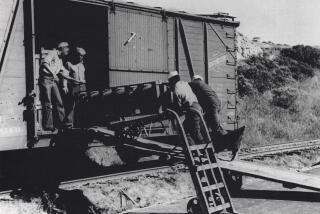Sailors’ 1944 Courts-Martial Upheld : Military: Navy had been asked to void rulings on racial grounds. The 258 men disciplined for refusing to load ammunition after an explosion were black.
- Share via
WASHINGTON — The Navy refused a request Thursday that it overturn on racial grounds the 1944 courts-martial of 258 black sailors who had refused to load live shells at the Port Chicago, Calif., ammunition depot two weeks after a huge explosion that killed 320 other men.
After a full-fledged review, Secretary of the Navy John H. Dalton upheld the 50-year-old judicial action, concluding that although the sailors had had “a reasonable basis for fear” after the initial explosion, there was no evidence that racial prejudice had tainted the trials.
Members of the California congressional delegation, who had backed legislation requiring the Navy to review the case, expressed dismay at the ruling, arguing that in view of the danger, the sailors’ action was “not an act of rebellion, but an act of self-preservation.”
Some of the black sailors who were involved in the 1944 incident said that they were ordered back to work while white sailors were excused from returning. “What they did back then was prejudice,” Percy Robinson, 69, one of the seamen involved, told the Associated Press.
The incident followed a July 17, 1944, explosion that blew up two Navy ammunition ships, leveled portions of Port Chicago and resulted in the highest single wartime loss of life within the continental United States. The depot is now the Concord Naval Weapons Station.
Nearly all the men involved were on the base during the July 17 explosion, and some were injured in the blast. When they were ordered to resume their loading, in early August, 206 of them initially balked, contending that it was unsafe, but eventually returned to their jobs.
Another 50 who refused to follow orders to return to work were court-martialed, tried for mutiny, and sentenced to 15-year prison terms. They were released after 16 months on orders from the secretary of the Navy.
The remaining two were charged with unauthorized absences.
Although all but a handful of the 258 were given bad-conduct discharges--including the 50 convicted of mutiny--most later were returned to duty and received honorable discharges of various degrees, with no loss of veterans benefits.
As was the custom in the U.S. armed forces at the time, the black sailors were assigned to menial tasks and were segregated from whites in both their work and their living facilities.
The case was brought up for reconsideration in early 1993 after four California lawmakers tacked a rider onto the annual defense authorization bill ordering the secretary of the Navy to review all 258 cases.
Before reaching Dalton, the appeals were reviewed by a three-member panel created early last year by the Board of Correction of Naval Records and by the Navy’s judge-advocate general, two agencies that traditionally are involved in such requests.
The board, although conceding that the Navy had been guilty of discrimination in assigning the sailors to load ammunition, found that prejudice had played no part in the courts-martial or the resulting sentences.
It also argued that although the sailors had “a reasonable basis for fear” after the earlier explosions at Port Chicago, the danger that they faced was no greater than that faced by sailors in combat. Seventy other sailors followed orders and loaded the ammunition.
And the board said that the Navy already had shown leniency in the cases by overturning the prison terms and initial bad-conduct discharges and by allowing the sailors to continue serving in the fleet. Dalton concluded Thursday that the courts-martial were properly conducted.
A 1989 book by Oakland writer Robert Allen contended that the Navy did not allow testimony about either the causes of the explosion or the unsafe conditions at the depot. The court-martial board took just over an hour to find the 50 men guilty of mutiny.
The four lawmakers who had pressed for reconsideration--Reps. George Miller (D-Martinez), Oakland Democrats Ronald V. Dellums and Pete Stark and Sen. Barbara Boxer (D-Calif.)--had argued that the sailors had been forced into the dangerous situation “specifically because they were black.”
More to Read
Sign up for Essential California
The most important California stories and recommendations in your inbox every morning.
You may occasionally receive promotional content from the Los Angeles Times.










